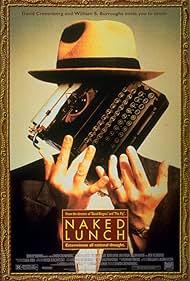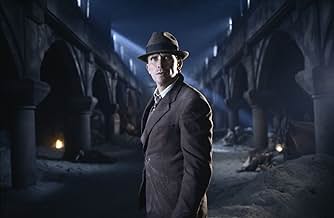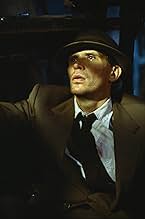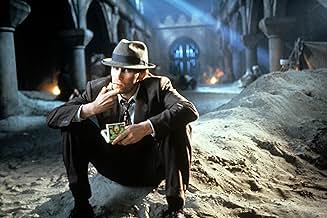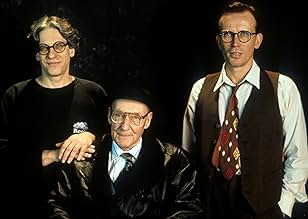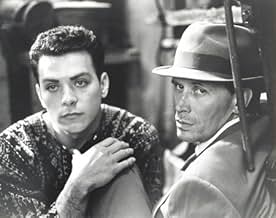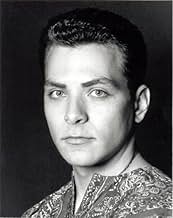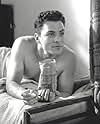After developing an addiction to the substance he uses to kill bugs, an exterminator accidentally kills his wife and becomes involved in a secret government plot being orchestrated by giant ... Read allAfter developing an addiction to the substance he uses to kill bugs, an exterminator accidentally kills his wife and becomes involved in a secret government plot being orchestrated by giant bugs in a port town in North Africa.After developing an addiction to the substance he uses to kill bugs, an exterminator accidentally kills his wife and becomes involved in a secret government plot being orchestrated by giant bugs in a port town in North Africa.
- Director
- Writers
- Stars
- Awards
- 13 wins & 17 nominations total
Joseph Scoren
- Kiki
- (as Joseph Scorsiani)
Louis Ferreira
- Exterminator #3
- (as Justin Louis)
- Director
- Writers
- All cast & crew
- Production, box office & more at IMDbPro
Featured reviews
If you're interested in the author of the book or the director of this film you have either already watched this film or you're waiting for the right time to watch it.
If you found this film by accident all you need to know to decide if its for you is that it is both the most homosexual and meta contextual film ever made and a solid contender for one of the most surreal films.
Do not recommend for family movie night unless you have ulterior motives or you're related to film/literature nerds.
If you found this film by accident all you need to know to decide if its for you is that it is both the most homosexual and meta contextual film ever made and a solid contender for one of the most surreal films.
Do not recommend for family movie night unless you have ulterior motives or you're related to film/literature nerds.
I'm always dubious when books I love are made into movies. They never QUITE translate and something is always lost. The idea of filming 'Naked Lunch' is even more difficult than usual, because it isn't really a novel with a coherent, chronological narrative, more a sequence of surreal, absurdly dark and funny "skits". As such it would be impossible to make a successful movie out of the raw material Burroughs created. Luckily Cronenberg (and who would have been better equipped to make this?) has cannily blended scenes from the book with incidents inspired by William Burroughs real life, and made it work. Very well.
Fans of Burroughs are sure to be more satisfied with this than the more literal and less imaginative 'Beat'. Non-fans will hopefully be inspired to read Burroughs' work after watching this. Peter Weller is perfectly cast as Bill Lee, and the supporting cast are also fine. I like most of Cronenberg's output, and I would rate 'Naked Lunch' as one of his most successful movies, and the best depiction so far of the Beat sensibility.
Fans of Burroughs are sure to be more satisfied with this than the more literal and less imaginative 'Beat'. Non-fans will hopefully be inspired to read Burroughs' work after watching this. Peter Weller is perfectly cast as Bill Lee, and the supporting cast are also fine. I like most of Cronenberg's output, and I would rate 'Naked Lunch' as one of his most successful movies, and the best depiction so far of the Beat sensibility.
New York 1953. Bill Lee is a bug exterminator who follows his wife down the road of using the bug powder as a hallucinatory drug. When he is picked up by the police for suspected drug use he is left in the cell with a large bug that tells him that he is on a mission and must watch his wife. When he accidentally kills his wife he flees to Interzone to prepare his report, increasingly losing his grip on what is real and what is not.
I have seen this movie several times and am always taken in by it. In terms of narrative it is not the strongest film you'll ever see. In all honesty the plot is pretty thin and the film is best seen as a journey into destruction with Lee's drug addled writer slowly but surely losing grip on reality with every passing moment. The journey is reasonably interesting, even if it doesn't have enough pace to really be fascinating. What does hold the attention is the imagination of the film and it's ability to put onscreen a decent representation of Lee's hallucinations.
The effects are very good but it is their use that is better. While it does have a certain amount of gore, the creatures and hallucinations are actual characters (creepy characters at that) that are used well within the story, rather than just being effects or gore. The cast can't all say that and some of them are distinctly average at times. Weller is as good as ever in a dead eyed performance that gives way to madness and fear at times. Davis is every bit as good, delivering two roles and be riveting in both. Holm is OK and it's not his fault that I couldn't get Bilbo out of my mind! Sands and Schneider don't have enough to do but are interesting faces.
Cronenberg is the perfect choice for director, but it is good that he holds back from the full on gore or body horror, call it what you will. He uses a measured camera to film the hallucinations rather than using swinging `crazy' angles to portray mental state - that is a lazy technique. Here Cronenberg (and Weller's blank face) calmly and methodically fall into despair and it is good to watch.
Overall, this is not a perfect film - it is slow and the narrative doesn't totally grip, however it manages to make a good fist out of filming a descent into a hallucinatory nightmare. Worth seeing it once, but I can't imagine that the word `enjoyable' would really ever apply to this film.
I have seen this movie several times and am always taken in by it. In terms of narrative it is not the strongest film you'll ever see. In all honesty the plot is pretty thin and the film is best seen as a journey into destruction with Lee's drug addled writer slowly but surely losing grip on reality with every passing moment. The journey is reasonably interesting, even if it doesn't have enough pace to really be fascinating. What does hold the attention is the imagination of the film and it's ability to put onscreen a decent representation of Lee's hallucinations.
The effects are very good but it is their use that is better. While it does have a certain amount of gore, the creatures and hallucinations are actual characters (creepy characters at that) that are used well within the story, rather than just being effects or gore. The cast can't all say that and some of them are distinctly average at times. Weller is as good as ever in a dead eyed performance that gives way to madness and fear at times. Davis is every bit as good, delivering two roles and be riveting in both. Holm is OK and it's not his fault that I couldn't get Bilbo out of my mind! Sands and Schneider don't have enough to do but are interesting faces.
Cronenberg is the perfect choice for director, but it is good that he holds back from the full on gore or body horror, call it what you will. He uses a measured camera to film the hallucinations rather than using swinging `crazy' angles to portray mental state - that is a lazy technique. Here Cronenberg (and Weller's blank face) calmly and methodically fall into despair and it is good to watch.
Overall, this is not a perfect film - it is slow and the narrative doesn't totally grip, however it manages to make a good fist out of filming a descent into a hallucinatory nightmare. Worth seeing it once, but I can't imagine that the word `enjoyable' would really ever apply to this film.
Films about writers and the creative process are not generally action-packed, but this unusual piece has plenty of incident. The action takes place largely inside the mind of "William Lee" (William S. Burroughs) whose first book "Junkie: Confessions of an Unredeemed Drug Addict" dealt with his struggle against heroin addiction. "The Naked Lunch", set in the early 1950s, could be described as telling how that book came to be written. Lee does it tough. After "drying out" he has a job as a pest exterminator, killing cockroaches with powder from a cannister. He discovers that his wife Joan, still an addict, is shooting up with the bug powder and having sex openly with two of his literary friends, Hank and Martin. He then manages to kill her accidentally with his pistol ("I guess it's about time for our William Tell routine"). He flees the country and washes up in "Interzone" (Tangier - then an "international" city).
He tries to write but suffers from frequent hallucinations. He imagines his typewriter is a giant speaking bug whose mission is to act as his "Interzone" spyforce controller. He becomes involved with another expatriate literary couple, Tom and Joan Frost, and imagines that Tom is trying to kill his wife. Naturally he seduces the wife. Then he discovers he has a taste for gay sex, very easily indulged in locally, where there is a gorgeous willing boy such as Kiki ready to slide off the nearest bar stool. There is competition though from various other slimy types, including a rich gay predatory Swiss expatriate, Yves.
Somehow, the book gets written, and Hank and Martin show up just as Lee bottoms out in psychotic despair. They help him piece it together and head off back to New York, leaving Lee to "Interzone" and his hallucinations.
It takes a bit of discipline to watch this film - never has the creative process looked quite so destructive of the writer. Yet the whole thing has a lightness of touch about it. Lee never quite goes right over the edge and is able to observe himself with a certain amount of ironic detachment. At the same time, it is clear that the death of his wife has affected him deeply, both in terms of loss and guilt. The typewriter bugs are a cute touch. Burroughs was the grandson of the founder of the Burroughs office machinery empire, the man who patented the first practical adding machine - the mechanical bug runs in the family it seems. Abusive psychiatry also gets a send up.
As Lee, Peter Weller has a face as impassive as a homicide cop almost regardless of the turmoil within (after all, he made the role of Robocop his own). But he is a "tough guy" on the point of melt-down. Judy Davis, looking just right, plays with plenty of conviction both Joans (who in Lee's fevered brain are the same person). Ian Holm is good as Tom, the nasty older writer who is quite happy to lend his wife for sexual purposes but woe betide the man who damages his precious Arabic typewriter. Julian Peters as Yves radiated menace but overall was a bit of a cardboard-cutout, not helped by his dress and appearance, which seemed to have come straight from "Brideshead Revisited" (Sebastian in Morocco).
David Cronenberg as a director has certainly got a reputation for weird films ("The Fly", "Crash") but this offering is relatively restrained It was something of a pity that "Interzone" was a studio set somewhere (Canada?) but this is low-budget stuff after all. Unlike the bugs in "Fear and Loathing in Las Vegas", these ones have a story to tell, though it's a painful one. Like Hunter Thompson, Burroughs was a great prose writer and the film has plenty of good lines. No-one could view heroin addiction with equanimity after seeing this film, but there is no moralising. As bug agent Clark Nova put it in the film:
"Just remember this. All agents defect, and all resisters sell out. That's the sad truth, Bill. And a writer? A writer lives the sad truth like anyone else. The only difference is, he files a report on it."
He tries to write but suffers from frequent hallucinations. He imagines his typewriter is a giant speaking bug whose mission is to act as his "Interzone" spyforce controller. He becomes involved with another expatriate literary couple, Tom and Joan Frost, and imagines that Tom is trying to kill his wife. Naturally he seduces the wife. Then he discovers he has a taste for gay sex, very easily indulged in locally, where there is a gorgeous willing boy such as Kiki ready to slide off the nearest bar stool. There is competition though from various other slimy types, including a rich gay predatory Swiss expatriate, Yves.
Somehow, the book gets written, and Hank and Martin show up just as Lee bottoms out in psychotic despair. They help him piece it together and head off back to New York, leaving Lee to "Interzone" and his hallucinations.
It takes a bit of discipline to watch this film - never has the creative process looked quite so destructive of the writer. Yet the whole thing has a lightness of touch about it. Lee never quite goes right over the edge and is able to observe himself with a certain amount of ironic detachment. At the same time, it is clear that the death of his wife has affected him deeply, both in terms of loss and guilt. The typewriter bugs are a cute touch. Burroughs was the grandson of the founder of the Burroughs office machinery empire, the man who patented the first practical adding machine - the mechanical bug runs in the family it seems. Abusive psychiatry also gets a send up.
As Lee, Peter Weller has a face as impassive as a homicide cop almost regardless of the turmoil within (after all, he made the role of Robocop his own). But he is a "tough guy" on the point of melt-down. Judy Davis, looking just right, plays with plenty of conviction both Joans (who in Lee's fevered brain are the same person). Ian Holm is good as Tom, the nasty older writer who is quite happy to lend his wife for sexual purposes but woe betide the man who damages his precious Arabic typewriter. Julian Peters as Yves radiated menace but overall was a bit of a cardboard-cutout, not helped by his dress and appearance, which seemed to have come straight from "Brideshead Revisited" (Sebastian in Morocco).
David Cronenberg as a director has certainly got a reputation for weird films ("The Fly", "Crash") but this offering is relatively restrained It was something of a pity that "Interzone" was a studio set somewhere (Canada?) but this is low-budget stuff after all. Unlike the bugs in "Fear and Loathing in Las Vegas", these ones have a story to tell, though it's a painful one. Like Hunter Thompson, Burroughs was a great prose writer and the film has plenty of good lines. No-one could view heroin addiction with equanimity after seeing this film, but there is no moralising. As bug agent Clark Nova put it in the film:
"Just remember this. All agents defect, and all resisters sell out. That's the sad truth, Bill. And a writer? A writer lives the sad truth like anyone else. The only difference is, he files a report on it."
God, I like Cronenberg. I like his commitment. I like his designs. I like the fact that he deals straight and heavy.
I even like the feel of this movie while at the same time noting that it fails, at least it fails if you consider the value of the book.
The book is one of many that deals with the sliding overlap between one reality and another. I welcome any of these. And this is particularly attractive because of the animate typewriters-become-agent-controllers. These are much more visceral in the film. But the book made much of the scintillating overlap, the typed page that touched the earth from time to time that we would literally hold in our hands to assure us that there was a reality.
Cronenberg has none of this. As with all his films, there is one world, and he invests heavily in making it real. So we see ourselves, the typewriter that takes control, that provides the trance, the words, the enticement toward perversion of several types and its means. Cronenberg's slip into alternative universes is slippery only one way; he won't let us come home. I admire this, because I would rather see passion invested by an artist than compromise for something as trivial as effect. But here, I do miss the effect.
Judy Davis is her usual sublime self. The character (actually two, sortof) is a mess and is never anchored. But she herself is, outside the film. Her character's role is crucial to the thing, a sort of fulcrum around which the real and hallucinogenic revolve. Sex, meaning, holding onto the world. She accomplishes this not through the character, but the solid soul of the actress which shines through. Who else can do this? No one I know.
Ted's Evaluation -- 3 of 3: Worth watching.
I even like the feel of this movie while at the same time noting that it fails, at least it fails if you consider the value of the book.
The book is one of many that deals with the sliding overlap between one reality and another. I welcome any of these. And this is particularly attractive because of the animate typewriters-become-agent-controllers. These are much more visceral in the film. But the book made much of the scintillating overlap, the typed page that touched the earth from time to time that we would literally hold in our hands to assure us that there was a reality.
Cronenberg has none of this. As with all his films, there is one world, and he invests heavily in making it real. So we see ourselves, the typewriter that takes control, that provides the trance, the words, the enticement toward perversion of several types and its means. Cronenberg's slip into alternative universes is slippery only one way; he won't let us come home. I admire this, because I would rather see passion invested by an artist than compromise for something as trivial as effect. But here, I do miss the effect.
Judy Davis is her usual sublime self. The character (actually two, sortof) is a mess and is never anchored. But she herself is, outside the film. Her character's role is crucial to the thing, a sort of fulcrum around which the real and hallucinogenic revolve. Sex, meaning, holding onto the world. She accomplishes this not through the character, but the solid soul of the actress which shines through. Who else can do this? No one I know.
Ted's Evaluation -- 3 of 3: Worth watching.
Did you know
- TriviaPeter Weller turned down the lead role in RoboCop 3 (1993) to appear in this movie.
- GoofsThe glass shot off Judy Davis' head changes to a plastic glass. First instance as the glass is falling off her head after the shot and then at end of film it is a plastic glass Ms Davis balances on her head. It remains plastic until it falls to floor and changes back into glass.
- SoundtracksVaya Con Dios
Composed by Larry Russell / Inez James / Buddy Pepper
Performed by Les Paul and Mary Ford
Courtesy of Capitol Records
- How long is Naked Lunch?Powered by Alexa
Details
- Release date
- Countries of origin
- Languages
- Also known as
- El almuerzo desnudo
- Filming locations
- Toronto, Ontario, Canada(Studio, only interiors)
- Production companies
- See more company credits at IMDbPro
Box office
- Budget
- $16,000,000 (estimated)
- Gross US & Canada
- $2,641,357
- Opening weekend US & Canada
- $64,491
- Dec 29, 1991
- Gross worldwide
- $2,641,357
- Runtime1 hour 55 minutes
- Color
- Sound mix
- Aspect ratio
- 1.85 : 1
Contribute to this page
Suggest an edit or add missing content

